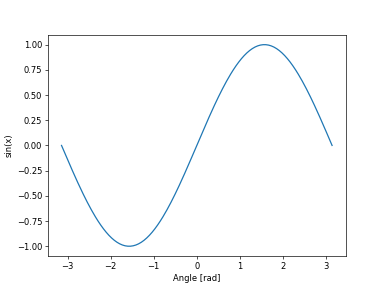Interoperability between NumPy and NLCPy
NLCPy provides a subset of NumPy’s API.
However, NLCPy ndarray (nlcpy.ndarray) implements __array__ method.
It enables you to pass NLCPy ndarray to a NumPy function.
Example 1:
>>> import nlcpy
>>> import numpy
>>>
>>> x = nlcpy.arange(3)
>>> y = nlcpy.arange(3)
>>> numpy.meshgrid(x, y)
[array([[0, 1, 2],
[0, 1, 2],
[0, 1, 2]]), array([[0, 0, 0],
[1, 1, 1],
[2, 2, 2]])]
Please note that numpy.meshgrid is the NumPy function, whereas x and y are both NLCPy ndarrays.
Note
NumPy functions run on an x86 Node (VH). On the other hand, most of NLCPy functions offload automatically input ndarrays to a Vector Engine (VE), and then run on the VE.
numpy.ndarray.Example 2 (Matplotlib):
>>> import nlcpy as vp
>>> import matplotlib.pylab as plt
>>>
>>> x = vp.linspace(-vp.pi, vp.pi, 201)
>>> type(x)
<class 'nlcpy.core.core.ndarray'>
>>>
>>> plt.plot(x, vp.sin(x))
...
>>> plt.xlabel('Angle [rad]')
...
>>> plt.ylabel('sin(x)')
...
>>> plt.axis('tight')
...
>>> plt.show()

Example 3 (Pandas):
>>> import nlcpy as vp
>>> import pandas as pd
>>>
>>> x = vp.random.rand(3,3)
>>> pd.DataFrame(x, index=list('abc'), columns=list('ABC'))
A B C
a 0.6575677252840251 0.7966675218194723 0.5927528077736497
b 0.1310200293082744 0.0033949704375118017 0.4242931657936424
c 0.343795241555199 0.88619629223831 0.9364728704094887
If you convert between nlcpy.ndarray and numpy.ndarray,
you should use nlcpy.asarray() and numpy.asarray().
In Example 4, nlcpy.asarray() transfers a NumPy ndarray from VH to VE, and then the ndarray is represented as a NLCPy ndarray.
Conversely, numpy.asarray() transfers a ndarray from VE to VH.
Example 4:
>>> x = numpy.arange(5)
>>> type(x)
<class 'numpy.ndarray'>
>>>
>>> x = nlcpy.asarray(x) # converts from numpy.ndarray to nlcpy.core.core.ndarray
>>> type(x)
<class 'nlcpy.core.core.ndarray'>
>>>
>>> x = numpy.asarray(x) # converts from nlcpy.core.core.ndarray to numpy.ndarray
>>> type(x)
<class 'numpy.ndarray'>
>>>
>>> x
array([0, 1, 2, 3, 4])
In addition, nlcpy.ndarray.get() returns a NumPy ndarray whose data is transferred from VE to VH.
Example 5:
>>> x = nlcpy.arange(5)
>>> type(x)
<class 'nlcpy.core.core.ndarray'>
>>>
>>> y = x.get() # converts from nlcpy.core.core.ndarray to numpy.ndarray.
>>> type(y)
<class 'numpy.ndarray'>
>>>
>>> y
array([0, 1, 2, 3, 4])
Note
When both nlcpy.ndarray and numpy.ndarray are passed to a NLCPy function,
the function returns the result as nlcpy.ndarray. Conversely, a NumPy
function returns the result as numpy.ndarray.
>>> import numpy, nlcpy
>>> x = nlcpy.arange(10)
>>> y = numpy.arange(10)
>>>
>>> type(x+y)
<class 'nlcpy.core.core.ndarray'> # ndarray of nlcpy
>>>
>>> type(nlcpy.add(x,y))
<class 'nlcpy.core.core.ndarray'> # ndarray of nlcpy
>>>
>>> type(numpy.add(x,y))
<class 'numpy.ndarray'> # ndarray of numpy
Auto Replacing to NumPy
Since v2.2.0, NLCPy automatically replace almost functions and methods that implemented not yet to the NumPy’s one.
Before v2.2.0:
>>> import nlcpy >>> nlcpy.nancumsum(nlcpy.array(1)) Traceback (most recent call last): File "<stdin>", line 1, in <module> AttributeError: module 'nlcpy' has no attribute 'nancumsum'
Since v2.2.0:
>>> import nlcpy >>> nlcpy.nancumsum(nlcpy.array(1)) array([1]) # 1. transfer argument value to VH # 2. execute NumPy's function # 3. transfer result value to VE
If you want to limit this feature, please set an environment variable VE_NLCPY_ENABLE_NUMPY_WRAP to NO or no.
The default is YES.
$ VE_NLCPY_ENABLE_NUMPY_WRAP=NO python >>> import nlcpy >>> nlcpy.nancumsum(nlcpy.array(1)) ... NotImplementedError: nancumsum is not implemented yet.
Note
When using Python3.6, this feature does not work for module level functions; such as nlcpy.xxx, nlcpy.linalg.xxx, or nlcpy.random.xxx.